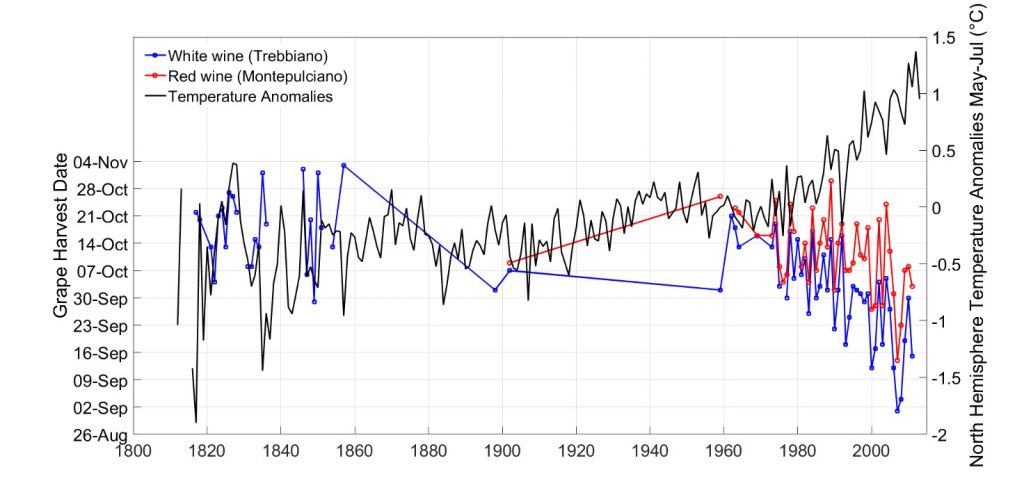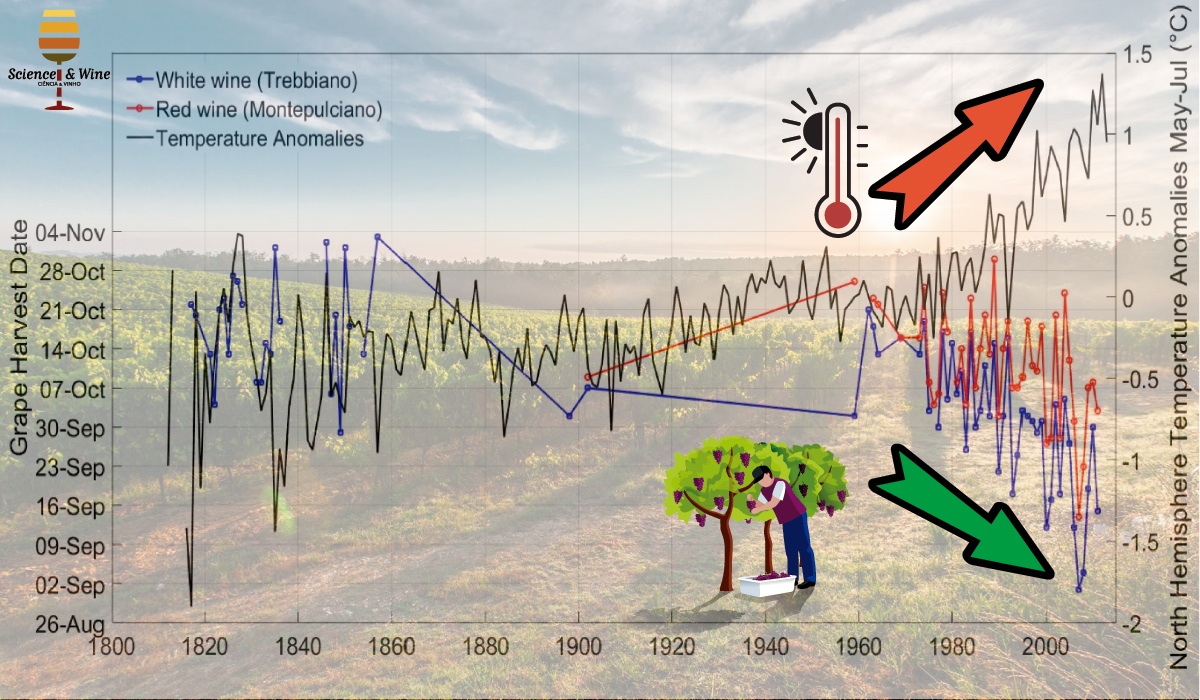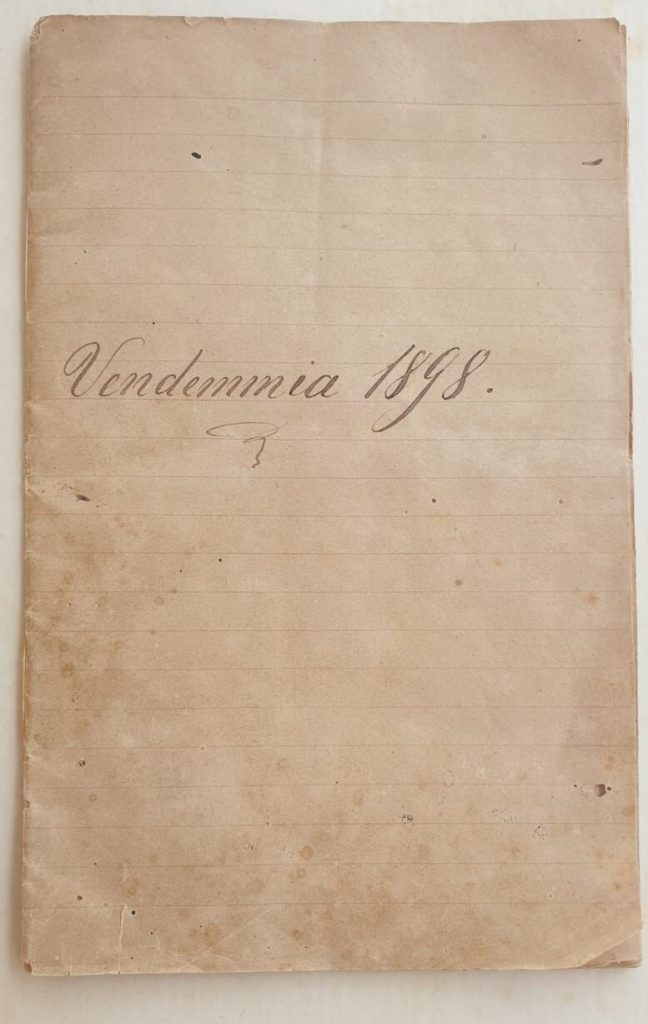By Francesco Paolo Valentini and Piero Di Carlo
Valentini’s winery has been present in Loreto Aprutino, Abruzzo region in Central Italy, since 1650. Besides the vineyards that cover more than 65 hectares of vine, Valentini produces extra virgin olive oil from a native variety (Dritta di Loreto), it covers 70 hectares of plant while further 115 hectares are devoted to wheat. The winery is famous for producing three types of wine, also obtained from native varieties: white wine from Trebbiano d’Abruzzo grapes and red wine, cerasuolo (rosé) from Montepulciano d’Abruzzo grapes. Vinifications are strictly traditional and artisanal, that means no control of fermentation temperatures, no acidification or deacidification, no addition of concentrated musts, no addition of lactic bacteria and no filtration. Therefore, these traditional techniques are particularly affected by climate change. In the vineyard an anticipation of the sugar maturation of 20/30 days has been observed compared to the vintages of the past, a stop in the phenolic maturation has also been noted, visually detectable with a freeze of the lignification of the grape seeds, which remain green and bitter to the taste. Even the grape pulp tends, in part, to remain tied to the seeds. The coloring matter of grapes (polyphenols) is more deficient and unstable than it used to be. In the cellar fermentation stops, caused by the increase in spontaneous fermentation, have been found. Wines tend to show more difficulties to get clear due to more protein-rich grapes and mild winters. Often the pH of wines tends to rise with the consequent collapse of the total acidity of the wine. Even the organoleptic characteristics have varied and the wines are less bitter, fruitier and more veiled than before. This is because there is no phenolic ripening and the grapes tend to be more “cooked” by the sun and high temperatures. Many more phytopathologies are also found both in the olive trees and the vines, above all a proliferation of insects (many of which are new to these latitudes) due to climate changes.
Figure 1. The notebook of the harvest of the year 1898 (on the left), a picture of the Valentini’s Winery (on the left).
Since 1817, the harvest date of grape wine has been noted by the Valentini’s Winery and what is observed is that the date of the beginning of the harvest, and therefore the maturation of the grapes, always fell around the middle of October, for over 140 years (from 1817 and up to 1980), in the last 40 years, instead, there was a constant increase of the advance, with grapes ready to be harvested as early as the end of August (figure 1). Moreover, these dates advance as the temperature increases and, in particular, in the period after 1980, in which a sudden temperature increase was recorded, well mimed by a more marked advance of the harvest date (figure 2).

What has been observed in Abruzzo – about 6 days/°C of advance of the grape harvest date, is observed, on average, also in France, Switzerland and the United States. Vines, as well as plants in general, prefer a constant and moderate supply of water through frequent rains but of moderate intensity. Due to climate change, we observe a steady increase in severe weather events, it is increasingly common to have short but high intensity precipitation phenomena over the course of the year, with the result that the same amount of rain is recorded on annual average, but distributed over a much smaller number of rainy days.
In the study we conducted with Eleonora Aruffo of the University ‘G. d’Annunzio ‘of Chieti-Pescara, and William Brune of the Pennsylvania State University (Di Carlo et al., 2019) we identified temperature and intensity of rainfall as the only two parameters capable to justify the observed advance of the maturation, and therefore of the grape harvest date. The grape harvest date advance due to the increase of intensity of precipitation is of about 1.5 days /(mm/rainy days). This result is of notable importance both because it shows that the intensity of the precipitations is an amplifier of the negative effect of the temperature increase, in fact it induces a further advance of the harvest, and because the intensity of the precipitations is constantly increasing. The harvest date, as used in this research, can be a precise indicator of climate change, provided that there is no interference due to irrigation or use of fertilizers that mitigate the effects of climate change. The Valentini’s winery, one of the oldest and most awarded in Italy, respects a strict secular discipline that does not include irrigation or fertilizers and, from 1650, produces wines without changing the traditional techniques handed down from generation to generation. Therefore, the data recorded over the centuries by the Valentini family, allow to face climate studies and indirectly confirm the changes taking place through the use of an independent non-climatic datum.
In summary this work confirms the central role of temperature in inducing changes in vegetation stages, as observed in other parts of the world, but it introduces a novelty regarding precipitation: the increase of the precipitation intensities amplifies the effect of the temperature increase, in a sort of negative feedback that suggests a need to act immediately and decisively to mitigate and adapt to climate change.

Francesco Paolo Valentini is the owner of the “Azienda Agricola Valentini s.s.”, one of the oldest winery in Italy. His Winery is constantly prizewinner: the first one dates back to 1868 when Camillo Valentini was formerly recognized for the quality of his wines, and more recently, just to mention some of them: first classified at the “Best Italian Wine Awards 2012”, Oscar for the best white wine in 2005 and Oscar for the best rosé in 2003, 2008 and 2016. Besides the huge awards received as owner of the Valentini’s winery, Francesco Paolo has received several personal awards: 1) Member of the “Georgofili Academy”; 2) Member of the ” Associazione Nazionale Carabinieri “; 3) Grand Medal “Can Grande” (Verona 2016); 4) Angelo Betti Award, “Benemeriti viticultura italiana” (Award received from the President of the Italian Republic, Mattarella); 5) ” Medaglia Aprutium “, Mention: “For having honored the Land of Abruzzo” (Abruzzo Regional Council); 6) Award: ” Il valore dell’eccellenza: l’Abruzzo che non si arrende “, Mention: “For the extraordinary successes achieved in its activity, enhancing the values of Abruzzo” (Abruzzo Regional Council).

Piero Di Carlo is associate professor with tenure of atmospheric sciences and climate change at the University “G. d’Annunzio” of Chieti-Pescara (Italy). He graduated (BS+MD) in Physics summa cum laude. His Ph.D. degree is in Physics with emphasis on atmospheric science from University of L’Aquila, with a year and half of study abroad at the Pennsylvania State University (USA). He developed a TD-LIF system for measurements of NO2 and organic nitrates, installed on-board the UK research aircraft BAe-146, and used in different field campaigns. He was visiting professor at Harvard University, USA (2016), University of York, UK (2014) and at the Tokyo Metropolitan University, Japan (2010). In 2011 and 2017 he was the director of summer schools organized by a EU network of research aircrafts (EUFAR). Since 2016 has been Deputy Coordinator of the PhD program on Earthquake and environmental hazard and director of the Laboratory of physics-chemistry of the atmosphere and climatology at University “G. d’Annunzio” of Chieti-Pescara (Italy).
References
- Di Carlo P., Aruffo E., Brune W.H., Precipitation intensity under a warming climate is threatening some Italian premium wines. Sci Total Environ., 30, 508-513. doi: 10.1016/j.scitotenv.2019.05.449, 2019. (https://www.sciencedirect.com/science/article/pii/S0048969719325094?via%3Dihub)
http://biwawards.it/en/classifica-2012/. The Winesider Best Italian Wine Awards.



